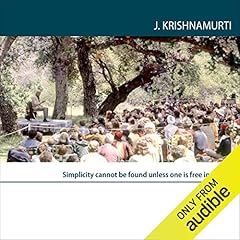
Why Do We Want to Dominate or Be Subservient to Another?
Ojai 1949 - Public Talk 11
No se pudo agregar al carrito
Solo puedes tener X títulos en el carrito para realizar el pago.
Add to Cart failed.
Por favor prueba de nuevo más tarde
Error al Agregar a Lista de Deseos.
Por favor prueba de nuevo más tarde
Error al eliminar de la lista de deseos.
Por favor prueba de nuevo más tarde
Error al añadir a tu biblioteca
Por favor intenta de nuevo
Error al seguir el podcast
Intenta nuevamente
Error al dejar de seguir el podcast
Intenta nuevamente
 Exclusivo para miembros Prime: ¿Nuevo en Audible? Obtén 2 audiolibros gratis con tu prueba.
Exclusivo para miembros Prime: ¿Nuevo en Audible? Obtén 2 audiolibros gratis con tu prueba.
Elige 1 audiolibro al mes de nuestra inigualable colección.
Acceso ilimitado a nuestro catálogo de más de 150,000 audiolibros y podcasts.
Accede a ofertas y descuentos exclusivos.
Premium Plus se renueva automáticamente por $14.95 al mes después de 30 días. Cancela en cualquier momento.
Compra ahora por $9.76
-
Narrado por:
-
Jiddu Krishnamurti
Why Do We Want to Dominate or Be Subservient to Another? - 20th August 1949.
- Why is it that we dominate, consciously or unconsciously?
- To submit oneself to another is the negative form of domination. We shall not be able to solve this problem by thinking in terms of opposites.
- Is not domination a process of isolation, which denies relationship?
- Can there be relationship between two people if there is any sense of domination or submissiveness?
- Q: Is not the experience of the past a help towards freedom and right action in the present?
- Q: Is my believing in survival after death a hindrance to liberation through self-knowledge?
- Q: Why is it certain individuals identify themselves with you or with your state of being and thereby gain authority for themselves?
Los oyentes también disfrutaron:




















Todavía no hay opiniones


